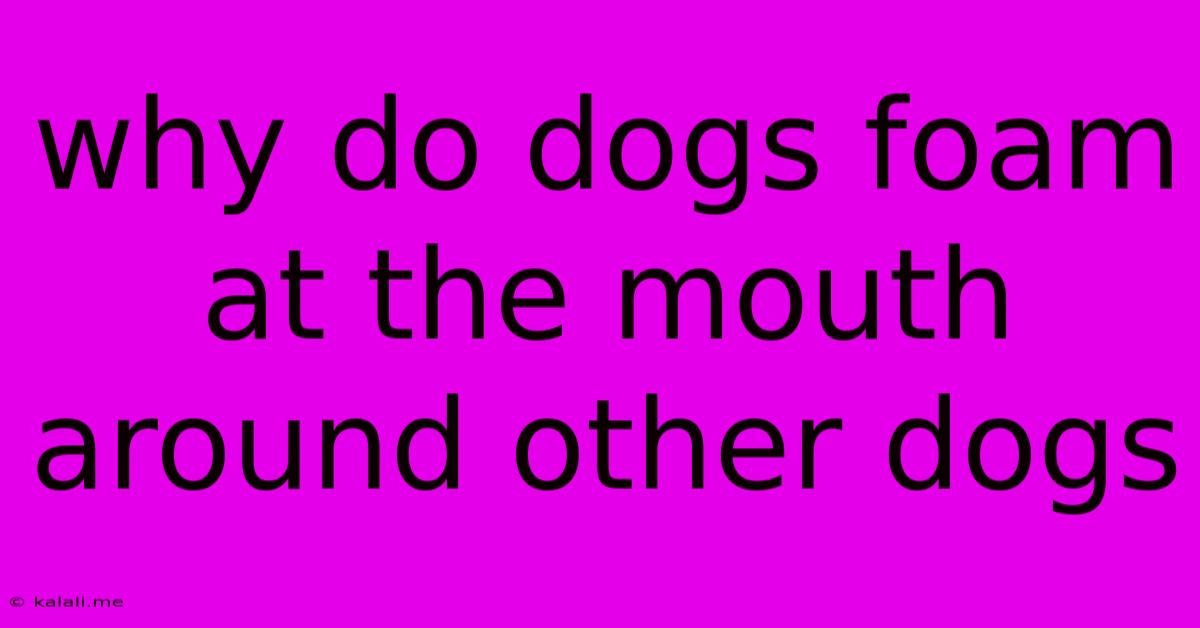Why Do Dogs Foam At The Mouth Around Other Dogs
Kalali
Jun 03, 2025 · 3 min read

Table of Contents
Why Do Dogs Foam at the Mouth Around Other Dogs? Understanding Canine Communication and Potential Problems
Have you ever witnessed your dog, usually calm and collected, suddenly start foaming at the mouth when another dog is nearby? This can be alarming, but understanding the potential reasons behind this behavior is crucial for responsible dog ownership. It's important to remember that foaming at the mouth isn't always a cause for immediate panic, but it warrants observation and potentially veterinary attention. This article will explore the various reasons why dogs might exhibit this behavior, ranging from simple excitement to serious medical conditions.
Possible Causes of Foaming at the Mouth Around Other Dogs
Several factors can contribute to a dog foaming at the mouth in the presence of other canines. Let's delve into the most common explanations:
1. Excitement and Stress: The Happy (and Not-So-Happy) Saliva
Sometimes, excessive salivation leading to foaming is simply a sign of heightened excitement or stress. Think about it – a dog encountering a new canine companion might experience a surge of adrenaline. This can trigger an increase in saliva production, resulting in visible frothing. This is especially true for dogs who are highly social or anxious around other dogs. The foaming is often accompanied by other telltale signs of excitement or stress, such as panting, tail-wagging (which can be stiff and high-pitched in stressed dogs), or even submissive urination.
2. Fear and Anxiety: A Subtler Sign of Distress
Conversely, foaming at the mouth can also be a subtle indicator of fear or anxiety. A dog feeling threatened or uncomfortable in the presence of another dog might exhibit this symptom along with other signs such as tucked tail, avoidance behavior, yawning (a stress appeasement signal), or lip-licking. Understanding your dog's body language is key to interpreting this behavior correctly. If the foaming is accompanied by signs of fear or aggression, it is crucial to monitor the situation carefully and avoid forcing interactions.
3. Disease and Illness: When Foaming Isn't Just Saliva
While excitement and stress are common culprits, foaming at the mouth can also signal underlying medical issues. These conditions can range from relatively mild to severe:
- Rabies: This is a serious viral disease that affects the nervous system, causing various symptoms including excessive salivation, changes in behavior, and aggression. Rabies is a zoonotic disease, meaning it can be transmitted to humans. If you suspect your dog has rabies, seek immediate veterinary attention.
- Kidney Disease: Kidney problems can lead to increased thirst and salivation, which might manifest as foaming.
- Liver Disease: Similar to kidney disease, liver dysfunction can also cause excessive salivation.
- Seizures: Foaming can occur during or after a seizure.
- Poisoning: Ingestion of toxins can trigger excessive salivation and other symptoms.
4. Dental Issues: A Painful Cause
Dental problems, such as gingivitis, periodontal disease, or abscesses, can cause discomfort and lead to increased salivation. Regular dental checkups are crucial for maintaining your dog's oral health and preventing these issues.
What to Do If Your Dog Foams at the Mouth Around Other Dogs
Observing your dog's overall behavior is paramount. If the foaming is accompanied by other signs of excitement, stress, or fear, try to manage the interaction with other dogs. Provide a safe space and avoid forcing interactions. However, if the foaming is accompanied by other unusual symptoms such as lethargy, vomiting, diarrhea, tremors, or changes in behavior, seek immediate veterinary attention. A thorough examination will help determine the underlying cause and guide appropriate treatment.
Conclusion: Understanding the Context is Key
Foaming at the mouth in dogs can have various causes, ranging from simple excitement to serious medical conditions. By paying close attention to your dog's behavior and body language, and seeking veterinary care when necessary, you can ensure their health and well-being. Remember, prevention is key – maintaining good dental hygiene and providing a safe and enriching environment for your dog can help reduce stress and anxiety, minimizing the likelihood of excessive salivation.
Latest Posts
Latest Posts
-
Bathroom Vent Fan With No Wall Switch
Jun 05, 2025
-
How To Tame A Bat In Minecraft
Jun 05, 2025
-
4 Year Old Wont Stay In Bed At Night
Jun 05, 2025
-
Changing Weather Stripping On Bottom Of Door
Jun 05, 2025
-
How To Get Out Of Full Screen Mac
Jun 05, 2025
Related Post
Thank you for visiting our website which covers about Why Do Dogs Foam At The Mouth Around Other Dogs . We hope the information provided has been useful to you. Feel free to contact us if you have any questions or need further assistance. See you next time and don't miss to bookmark.